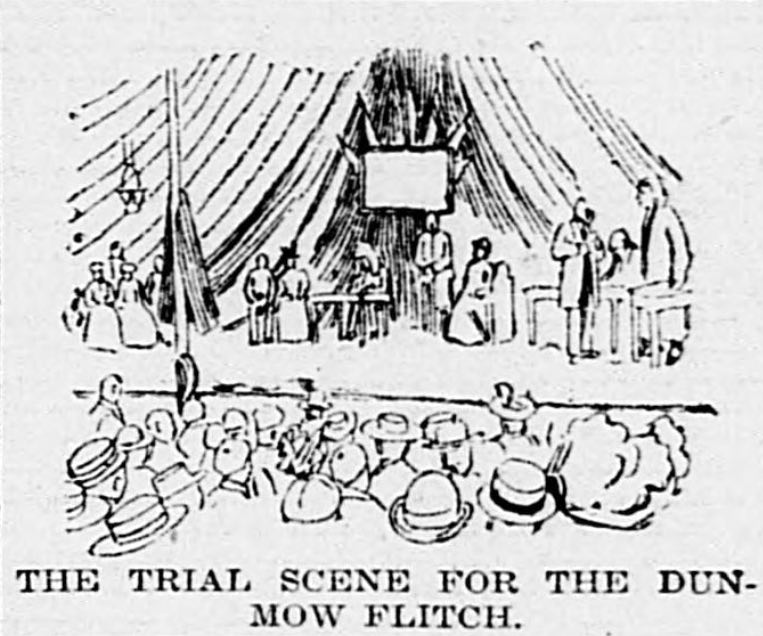
Imagine going 366 days without getting into an argument with your significant other. Could you do it? The Dunmow flitch was a celebration and a reward for couples in Dunmow, England who could refrain from arguing for a year or longer and live in marital bliss.

Could You Honestly Earn A “Flitch”?
Side of Bacon Go to Couples Who Have Not Quarreled for 366 Days
Court of Love in session. The two flitches of bacon hang beside the judge’s bench. Seated near the judge are Mr. and Mrs. Harry Smith, and next to them, Mr. and Mrs. Lewis F. Butcher, claimants for the bacon. The lawyer for the bacon is addressing the court.
By W.G. Shepherd
Dunmow, England, Sept. 10. — The Dunmow flitches are just two pieces of bacon, but they make your heart thrill.
I saw them hanging one on each side of the judge’s bench during the ancient rites which are known as proceedings of the Court of Love.
This Court of Love is exactly the reverse of a divorce court. Ever since the year 1111, with few interruptions, the two flitches of bacon have beeb given to the two couples of Dunmow who could prove that for 366 days they had not quarreled.
This year there were forty couples who claimed the bacon. For weeks the authorities of this court investigated the claims of the couples until they had narrowed down the claimants to two couples.
Then came the ceremony of the trial, when the judge sat between the two big brown and gold pieces of bacon and heard the final trial.
Of course it was all play, but sweet and tender play, in these days when happy couples are so hard to find.
On the platform, near the judge, sat the two couples, Mr. and Mrs. Harry Smith of Crewton, he being a postmaster, and Mr. and Mrs. Lewis Frank Butcher, he being a merchant of Tilty.
Near by sat the jury, composed of six young bachelors and six unmarried girls. It will be surprising if some of the members of the jury do not pair off before the next flitches are given out.
“What makes your wife so happy, if she is as happy as she says?” demanded the cross examiner of Smith.
“Because she’s an optimist. She always sees the silver lining of the black clouds,” said her husband.
“I gave up smoking for her when we were married twenty-six years ago,” said Smith proudly. “I wooed her two years.”
“Do you smoke now?”
“Yes. When I had my leg cut off three years ago my wife felt sorry for me, and she told me I could smoke again.”
“You don’t carry a latch key?”
“No. I’m always home by 10 o’clock at night. I’ve never once, in all the years, been home later than that.”
“Do you think your wife as pretty today as she was when you married her?”
“Prettier. I admire her more because I know her better.”
When Mrs. Smith took the stand, she said that the secret of her happiness was not optimism, as her husband had declared. Without any children it would have been impossible for her to have been optimistic or happy.
“We’ve got eight children,” she said, with downcast eyes, “and they’ve made us both happy. They’ve made our home a little heaven.”
The jury of bachelors and girls refused to leave the box, after hearing Mrs. Smith’s statement. They voted one flitch of bacon to Mr. and Mrs. Smith without a moment’s hesitation.
Mr. and Mrs. Butcher declared they had not had a cross word in their twenty years of married life.
The jury was unanimously in favor of Mr. and Mrs. Butcher.
Then suddenly all the play faded away, for the choir of boys sand sweetly a grand old wedding song, “Oh, Land of Hope and Glory.” There were some tears and some smiles, and many solemn faces, for there was something in the scene that held out hope of the day when every marriage ceremony, in every land, would mean a dream of happiness come true.
Source: The Day Book (Chicago, Illinois newspaper). September 10, 1912.

